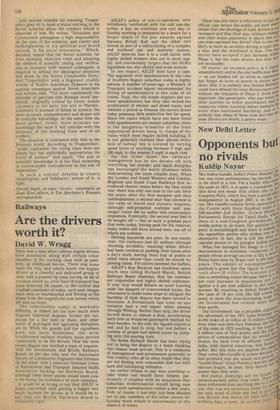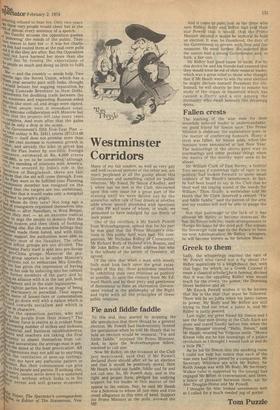New Delhi Letter
Opponents but no rivals
Kuldip Nayar
Mrs Indira Gandhi, India's Prime Minister, lost one more parliamentary by-election. '141'nt is the third in a row. For a leader who 0'nel-tit the polls in 1971, it is quite a comedown. ,er this does not mean that either she Congress Party, which has been a power 5y, independence in August 1947, is on the out. Mrs Gandhi remains firmly entrenched the Centre with three hundred seats 520-member Loh Sabha (Lower Hon here Parliament). Except for Tamil Nadu, w",-tie there is a non-Congress government.' "tie wields power in all states. Her position party is unchallenged and there is n obo the opposition parties who strikes one asac.! alternative. In fact, she is still the rn°st tioet -ii• ria ceptable person to the polyglot Indian ,h r What has damaged her image is a fur'. o' 4, deterioration in economic conditions O1' people whose average income is £21 a r1i°11evio it, Prices have risen by 30 per cent in the las years. The extent of unemploYmerit ly'l anybody's guess but the figure is certaiaolh much above 20 million. The economic!V gr° rate is something minus because there per cent increase in population Per rtt'5'' against a 2 per cent addition to the oat° to • income. By resorting to deficit financir giasts'l the tune of 19 per cent (Rs 850 crores bill: year) to meet the ever-increasing wage neY h the Government has created more 1 than goods. pat; , The Government has a plausible argurn; ' the aftermath of the 1971 India-Pakistan eetZ in the wake of an influx of 10 million reftre" from what was then East Pakistan, the faelt of of the rains in 1972 resulting in the impo,e ilt 5 million tons of food grains, and the hil‘have prices of commodities like oil would t-rtes, broken the back even of affluent coun'd' to ' India, with limited resources, was b0ple4 suffer. But this does not impress the Pc-stiev They voted Mrs Gandhi to power because,/ ,.; t had promised that she would end Povert'rty's "Garibi Hatao" (Oust Poverty) was her 13.3t be election slogan. At least, they should 11° poorer than they were. , 014 Her public meetings are no longe' emotion-packed rallies they were. There cetli more sullenness than anything else at a rrroast. one; that was not surprising either for w the only word of cheer she had tO gIV`tor that Britain was worse off with 001.Y t working days a week. At another Pa'"e'
ot, ink
Lye
iet5; LY1 be the ro; erl• loot
Na
ree lathering refused to hear her. Only two years ego these very people would cheer her at the rl,„(1 of almost every sentence of a speech. of'rs Gandhi accuses the opposition parties 1, 'Poisoning the minds of the public. They e reason to hate her — it was her charis:a that had routed them at the mid-term polls it is she they are after. But the Opposition ld not have harmed her more than she cuersoIl f has by rousing the expectations of e them. People so much and doing so little to fulfil She — and the country — needs help. Two Ifillonths ago the Soviet Union, which has a ittleen year security pact with India, thought s Would bolster her sagging reputation by Ae,ncling Comrade Brezhnev to New Delhi. 4reements for doubling trade between the h..° countries and expanding Russian-aided itojects like steel, oil and drugs were signed. Tillit What people want is immediate relief. ittieY welcome collaboration with Moscow but to °W that the projects will take many years t, complete. And even after that the gains '9d be only a drop in the ocean. tit'lle Government's fifth Five-Year Plan — e itotal outlay is Rs. 53411 crores ($71214.66 11)ill k ssOn.\ — itself does not promise more than Per cent increase in economic growth in ' Year, and already the hike in prices has s,,acle the Plan leaner by one-fifth. Foreign i2sistance, estimated at Rs. 4,000 crores wit°,000), is yet to be committed,' although ,1 the mending of relations with America, \vhich lib was annoyed by India's role in the .5 Iteration of Bangladesh, there are fair 15 if ft. Ces that the aid will come through. Even A cog`e Plan were to be fulfilled (one Planning it grornission member has resigned on the n'u ril nd that the targets are too ambitious), ;e or it i of re le le iii 0 ill t4d; 'late most of the Naxalites. The other ,efeohs'eal leftist groups are too divided. The 114atIgthtinist Party itself is split into pro-Soviet Sovt Pro-China groups. Moreover the proq° ihtret group appears to be under Moscow's Nbe Octions not to embarrass Mrs Gandhi. Mlieh,too has given the impression of having liore-',„ on her side by inducting into her cabinet 2. illaviv former members of the party and by .e141p,11g an alliance with it in the last poll, both ri'S :Vrliament and in the state legislatures. 0 ' h e rightist parties have an image of being 51 er reactionary or parochial. Their appeal the name of laissez-faire or communalism el not go .down well with a nation which is u'in..ed towards socialism and which is if `ci_r in character. iivoot the opposition parties, who will er the people from their misery? The e labour force is restive as is evident from tin11,creasing number of strikes and lockouts d_uustrial and business establishments; fits and teachers are taking the first
o .
rtunity to absent themselves from coln1 universities; the average man. is get0,Ns„t° the street at the least provocation. All 511"ie` exPressions may not add up to anything
" t the ventilation of pent-up feelings;
lierrrlay not have any particular pattern. or s ?nee. But their continuation can give -° the people and parties. If nothing else, re,,.UntrY cannot settle down to a sustained tat werk, without which India is in for unrest and still greater economic 441ip A,. Ihd.'vaYar, The SPectator's correspondent lizCla, is Editor of The Statesman, New
Y fear that it would make only a marginal ierence to people's plight.
band° whom do they turn? Not long ago a Na„Tho,f Youngsters organised themselves into WCafites — after Naxalbari, in West Bengal, tr_ere they met — as an extreme radical Dru41) to urge the people to destroy first the to„,esent system and then think of building ikluething else. But the senseless killings they Do liched made them hated, and with little AUla
k • . r support the authorities were able to



































 Previous page
Previous page